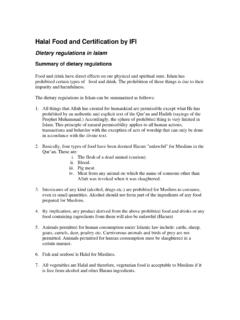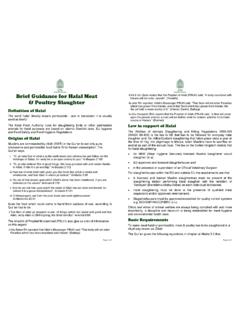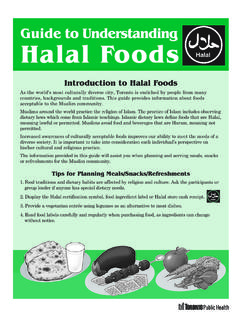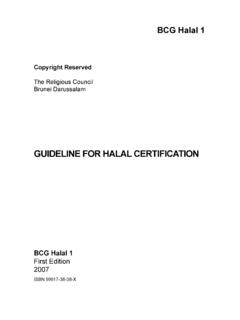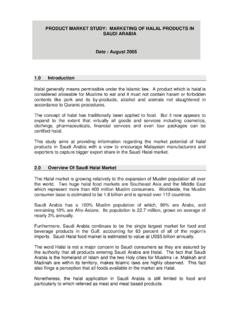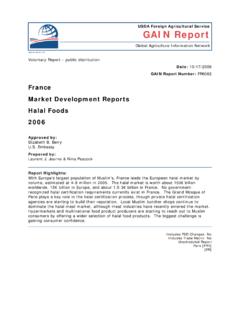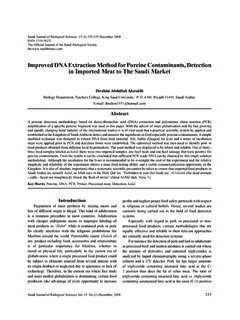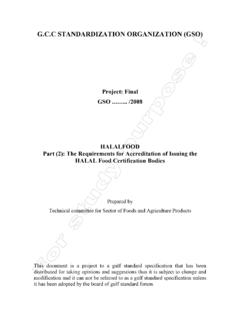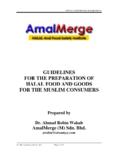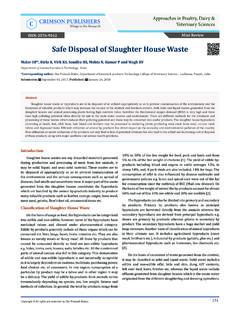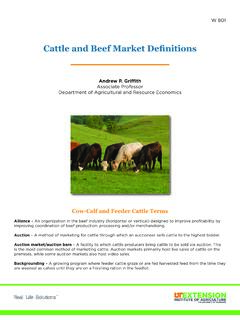Transcription of GUIDELINES FOR THE PREPARATION OF HALAL FOOD AND …
1 HALAL GUIDELINES for manufacturers GUIDELINES . FOR THE PREPARATION OF. HALAL FOOD AND GOODS. FOR THE MUSLIM CONSUMERS. Prepared by Dr. Ahmad Robin Wahab AmalMerge (M) Sdn. Bhd. 2004, AmalMerge (M) Sdn. Bhd. Page 1 of 12. HALAL GUIDELINES for manufacturers PREFACE. This GUIDELINES has been prepared based on the GUIDELINES of Foods, Drinks and Goods Utilized by Muslim' published by Bahagian Hal Ehwal Islam, Jabatan Agama Islam (Jabatan Kemajuan Islam Malaysia -JAKIM). Appendix 1 and 2 are extracts from the TRADE DESCRIPTIONS ACT on some definition and labeling requirement for HALAL products.
2 It is prepared as a guide for the manufacturing industry (food and non-food product manufacturers) to give a basic understanding of HALAL with the hope of assisting them to comply with the HALAL requirement in their manufacturing operations. JAKIM is the authorized government agency entrusted by the Malaysian Government to certify HALAL products and issue HALAL certificate to any manufacturer requiring HALAL certification. Further information and assistance could be obtained from AmalMerge (M) Sdn. Bhd. Amalmerge provides assistance and consultancy services to food manufactures and related industries in PREPARATION for HALAL compliance operation.
3 AmalMerge (M) Sdn. Bhd. could be contacted through e-mail: 2004, AmalMerge (M) Sdn. Bhd. Page 2 of 12. HALAL GUIDELINES for manufacturers INTRODUCTION. The processors of foods and goods for the Muslim market need to understand and comply with the specific requirements of the Muslim consumers before their product could be labeled as HALAL food in Malaysia. The use of the word HALAL (Permissible), CERTIFIED HALAL ', FOODS FOR MUSLIM' and other similar labeling is controlled under the Trade Description Act (Usage of HALAL /Permissible' statement) 1975. The consumption of HALAL foods and goods is compulsory to all Muslims.
4 Lack of knowledge, awareness and understanding of the HALAL concept among Muslims and the manufacturers of HALAL products may cause the loss of appreciation to HALAL . In fact the holy Quran addressed all human being and not just Muslim to search for HALAL and it is for their own benefit. One should understand that HALAL food requires that it is prepared in the most hygienic manner meeting international food safety standards and should not be viewed as offensive to any religious belief. The basic issue in HALAL food production is cleanliness, free from contamination' and healthy food as defined in the Quran.
5 Thus, these GUIDELINES are prepared to interpret and explain, to the processors and the public, either Muslim or non-Muslim, the HALAL and Haram (Non-Permissible). aspects as stipulated in Islamic laws. It covers foods, drinks, goods, slaughtering and utensils and equipments used by Muslims. These GUIDELINES contain the following particulars: 1. Important definitions as provided for the Trade Description Act (usage of Statement HALAL ') 1975. 2. Sources of foods and drinks 3. Slaughtering of animals 4. Alcohol usage 5. Presentation and storage 6. Processing and cooking of food 7. Hygiene 8.
6 Utilized Goods 9. The Label HALAL (Permissible). 10. Conclusion 2004, AmalMerge (M) Sdn. Bhd. Page 3 of 12. HALAL GUIDELINES for manufacturers 1. IMPORTANT DEFINITIONS AS PROVIDED FOR IN THE TRADE DESCRIPTION ACT [USAGE OF. STATEMENT HALAL (PERMISSIBLE) 1975]. ISLAMIC LAWS (SYARIAH LAWS). Islamic law as stipulated in fiqh Shafie' or laws as contained in any one of the fiqh of Maliki, Hambali or Hanafi which are approved by the King and enforced in the Federal Territory, Malacca, Penang, or approved by any other Ruler to be enforced in any other state in Malaysia. The sources of the Islamic laws are the Al Quran, Hadith, Ijma' and Qiyas.
7 Whichever food substances mentioned in any one of these sources mentioned above, be it HALAL (permissible) or Haram (forbidden), is interpreted as being Islamic Law. Since the main source of the Islamic Law is Al-Quran, all Islamic rules are also Allah's Law. It is not created by men and is not a burden to human being since it is for their own good, to have a better living in this wonderful world. It is also a tool to differentiate between those who are wise and those are not. DEFINITION OF HALAL (PERMISSIBLE). HALAL in general term means permitted, allowed, authorized, approved, sanctioned, lawful, legal, legitimate or licit.
8 The word Food for Muslims' or food certified HALAL ' or HALAL ' or having similar meanings can be define as follows: a) Free of, and not made of, or containing any part or substance taken or extracted from animal which are forbidden (HARAM) to be consumed by Muslims, according to Islamic laws. b) Not containing any substances, which is declared as filth according to Islamic Laws. c) Not prepared, processed, produced or manufactured using utensils, equipment and / or machinery which are not free from filthy substances as directed by Islamic Laws, and d) During PREPARATION , processing or storage, it should not come into contact or be in close proximity with any food which do not fulfill the requirements as stipulated in Paragraph (a), (b) or (c) or any substance declared as being filth according to Islamic Law.
9 FILTH ACCORDING TO ISLAMIC LAW: Filth is things that are considered as impure and dirty and it should not be used as foods, clothes, drinks or others. Filth, according to Islamic Law, are: 2004, AmalMerge (M) Sdn. Bhd. Page 4 of 12. HALAL GUIDELINES for manufacturers 1. Substances such as Pork, Blood and Carcasses (Carrion) which are filth by themselves and as such cannot be accepted as clean. 2. Clean substances contaminated by filth and cannot be purified. 3. Clean substances contaminated by filth and can be purified. 2. SOURCES OF HALAL FOODS AND DRINKS. The main sources of human food and drink are plants and animals that have been created by Allah on the earth, as a gift to its followers.
10 Therefore they should be appreciated. But these plants and animals came from various kind and species; some of them are HALAL and the others are Haram. Allah has created HALAL and Haram for the sake of human benefits. ANIMALS - it can be divided into two main categories: a) Land Animals. b) Water Animals. 1) Land Animals - All land animals are permitted to be eaten except: a) Animals not slaughtered according to Islamic Laws. b) Pigs. c) Dogs. d) Carnivorous animals that slash and kill, such as tigers, bears, elephants and other similar animals. e) Birds with claws or birds that feed by snatching and tearing, such as eagles and other birds similar.
